April 2025
The global mobile device management market size was USD 6.28 billion in 2023, calculated at USD 7.80 billion in 2024 and is expected to be worth around USD 68.24 billion by 2034. The market is slated to expand at 24.22% CAGR from 2024 to 2034.
The global mobile device management market size is worth around USD 7.80 billion in 2024 and is anticipated to reach around USD 68.24 billion by 2034, growing at a solid CAGR of 24.22% over the forecast period 2024 to 2034. The North America mobile device management market size reached USD 2.39 billion in 2023 and is expected to attain around USD 26.27 billion by 2034, poised to grow at a CAGR of 24.34% between 2024 and 2034. The rapid increase in smartphone use is a major contributor to mobile device management market growth.
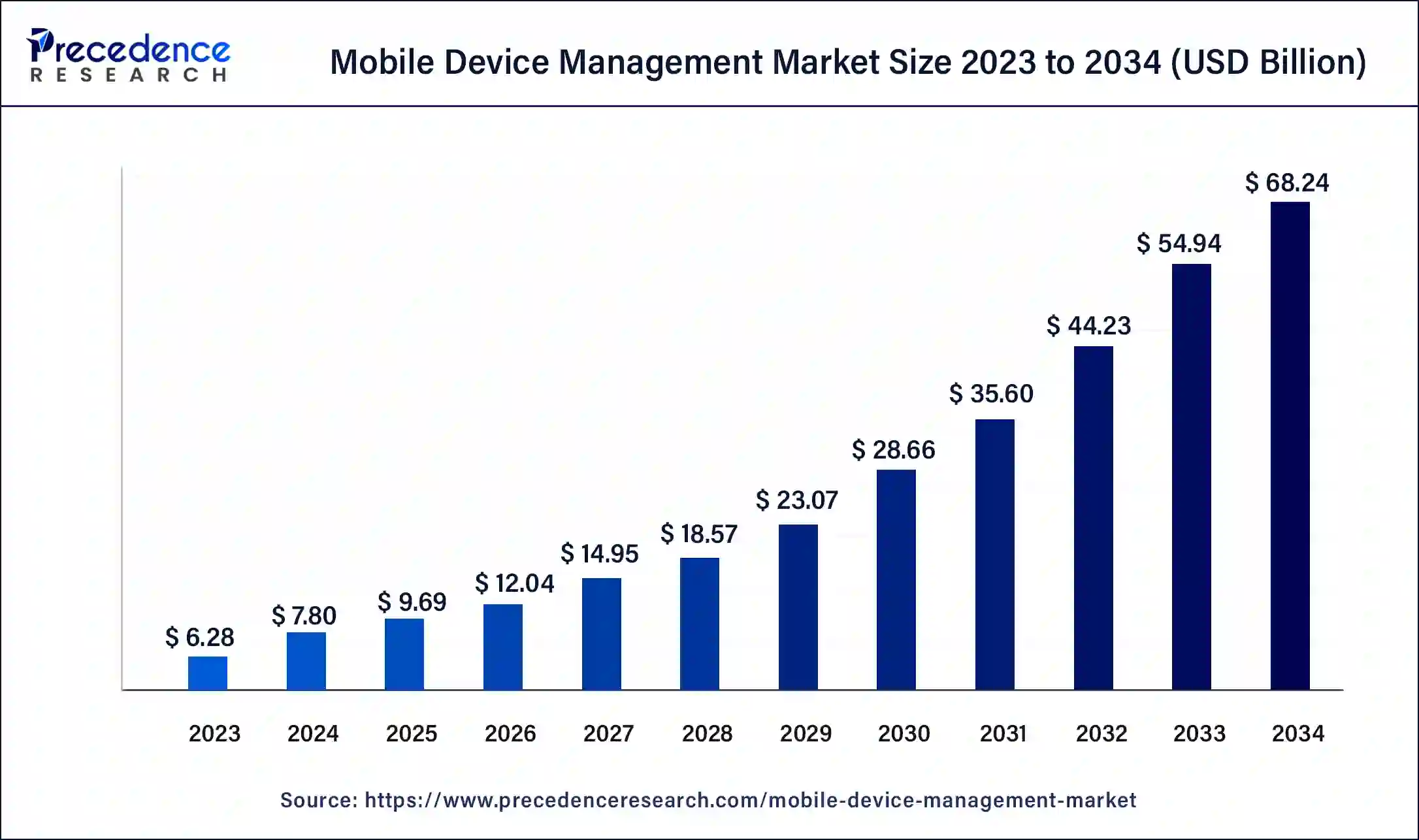
The global U.S. mobile device management market size is projected to be worth around USD 18.52 billion by 2034 from USD 2.07 billion in 2024, at a CAGR of 24.44% from 2024 to 2034.
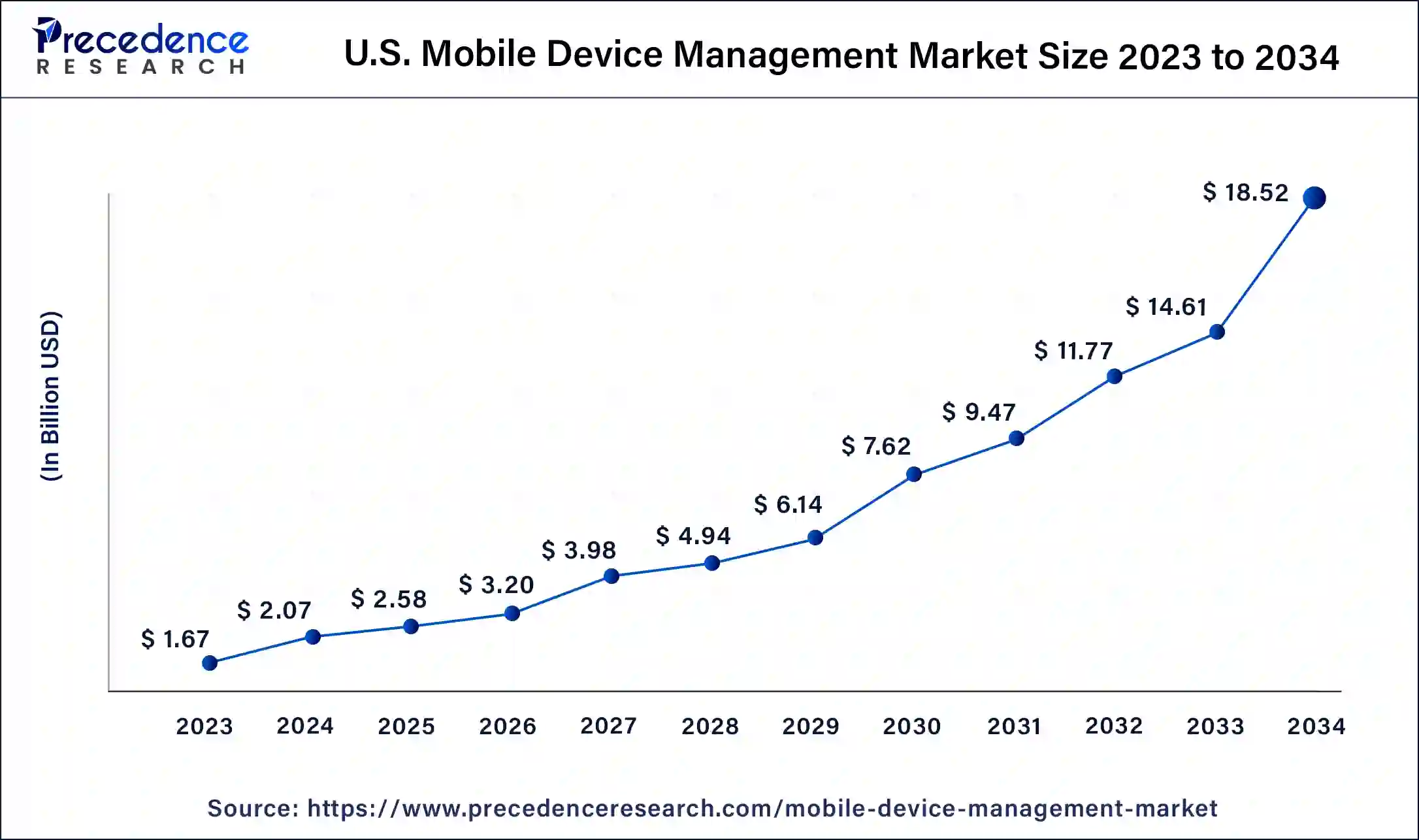
Asia Pacific dominated the global mobile device management market in 2023. increasing urbanization majorly in countries like China and India is leading towards the increasing use of mobile devices in corporate environments and educational setups. The region is also considered as the gateway to many opportunities in multiple emerging markets which increases the growth of the market.
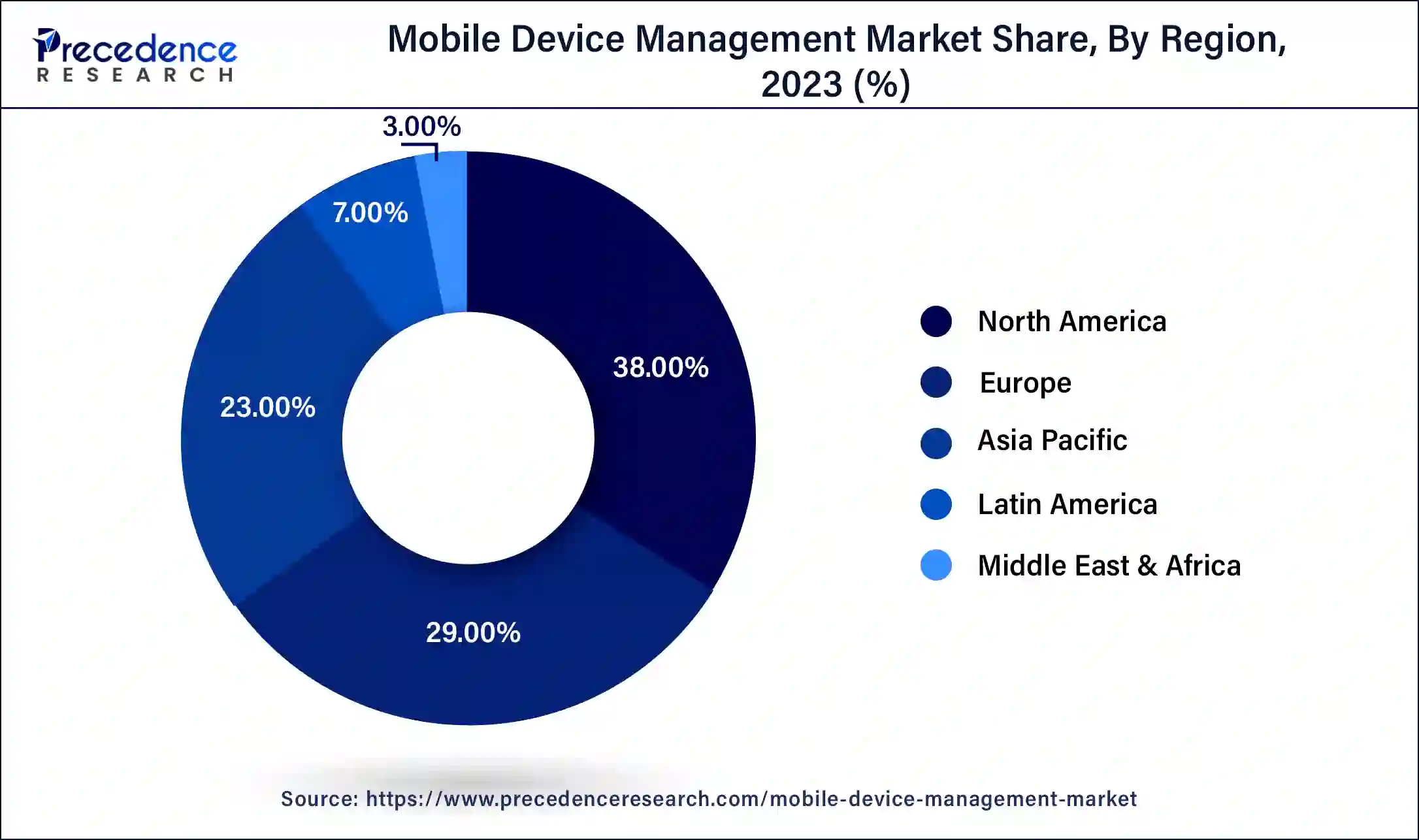
North America dominated the global mobile device management market with the largest share of revenue in 2023. The growth of the region lies behind the well-established IT infrastructure and access to various advanced technologies. The increasing workflow, especially in countries like the United States, is gaining the attention of MDM solutions. Their governments also promote digital transformation which increases the number of mobile devices like laptops, smartphones, and tablets. This increasing focus on improving the digital infrastructure is driving the growth of the mobile device management market.
Mobile device management (MDM) refers to software used by information technology (IT) administrators to monitor, manage, and secure employees' devices like mobile, tablets, and laptops. Organizations use MDM to ensure the confidentiality and safety of employees' data. The mobile device management software provides multiple features like managing the configurations and policies for mobile devices, including email accounts and many more. The mobile device management market is gaining significant demand due to the increasing number of laptop and tablet users in small and medium-sized businesses.
How AI is Changing the Mobile Industry?
The emergence of artificial intelligence (AI) has drastically changed the overall landscape of multiple sectors, helping many organizations to mark significant technological advancements, including in the mobile device management market. The increasing smartphone use and internet penetration raise the security standards for MDM, resulting in the demand for AI to protect devices from data threats and breaches.
AI can help automate device security by utilizing biometrics, NLP, and computer vision to track the behavior of the users and prevent possible threats and attacks using machine learning (ML). Technological advancements in AI and ML are providing personalized policies and smart assistance that will contribute to the growth of the mobile device management market.
| Report Coverage | Details |
| Market Size by 2034 | USD 68.24 Billion |
| Market Size in 2023 | USD 6.28 Billion |
| Market Size in 2024 | USD 7.80 Billion |
| Market Growth Rate from 2024 to 2034 | CAGR of 24.22% |
| Largest Market | North America |
| Base Year | 2023 |
| Forecast Period | 2024 to 2034 |
| Segments Covered | Solutions, Deployment, Device Type, Operating System, End-user, Enterprise, Vertical, and Regions |
| Regions Covered | North America, Europe, Asia-Pacific, Latin America and Middle East & Africa |
Rising security concerns
The increasing number of smartphone users has increased the amount of confidential data, which has also raised safety requirements. There are many threats, such as cyber-attacks, phishing, malware, and many others. Mobile device management helps IT administrators implement configuration across all devices, which ensures compliance with all security requirements within the organization. Various policies like screen lock, password, and encryption settings are being implemented by IT administrators, which plays a vital role in enhancing security. Thus driving the mobile device management market.
BYOD policy adoption
BYOD stands for bring your own device and refers to the employees using their devices like tablets, smartphones, and laptops for work. These devices are used for various operations by IT professionals, which increases the variety of departments that need to be managed. MDM solutions work on providing centralized control of the data managed by personal devices, which helps protect sensitive and confidential data. The influence of remote work culture has also saved the organization additional costs while maintaining the growth of the company.
Higher maintenance costs
Mobile device management has excelled significantly in the big companies, but there is still a restraining factor, especially in some medium and small-sized companies. The initial investments are slightly higher, which cannot be affordable by some companies; therefore, many large-cap companies. Additionally, the evolving technologies need highly qualified professionals, which can also be a restraining factor for many companies due to their budgetary limitations. Many companies are trying to increase their partnerships, which could help boost overall mobile device management market growth.
Rising internet penetration
Emerging technologies like 5G internet connection are anticipated to play a vital role in expanding the growth of the mobile device management market. This leads to the increasing number of smart devices as they enhance the overall user experience, which opens several opportunities for new businesses to mark their presence in the market. This also enables working remotely, which maintains the speed of the workflow. Government initiatives towards digital transformation are also expected to open multiple opportunities for the market in the upcoming years.
Increasing remote work influence
After the outbreak of the coronavirus, the significance of remote work has increased to manage the workflow. The adoption of remote work in organizations also helps them manage their financial costs. Companies also get the opportunity to expand their team to increase work efficiency and boost their overall growth. This increasing preference for remote work is anticipated to drive the growth of the mobile device management market.
The software segment held the largest share of the mobile device management market in 2023. The growth of this segment is attributed to the heavy investment by companies in MDM, which helps manage and monitor mobile devices. It provides many features like configuration management, device enrollment, and policy enforcement. Advancements in encryption help protect devices from unauthorized access, which increases the reliability of mobile device management software. The constantly evolving technological advancements are expected to play a key role in the overall development of the market.
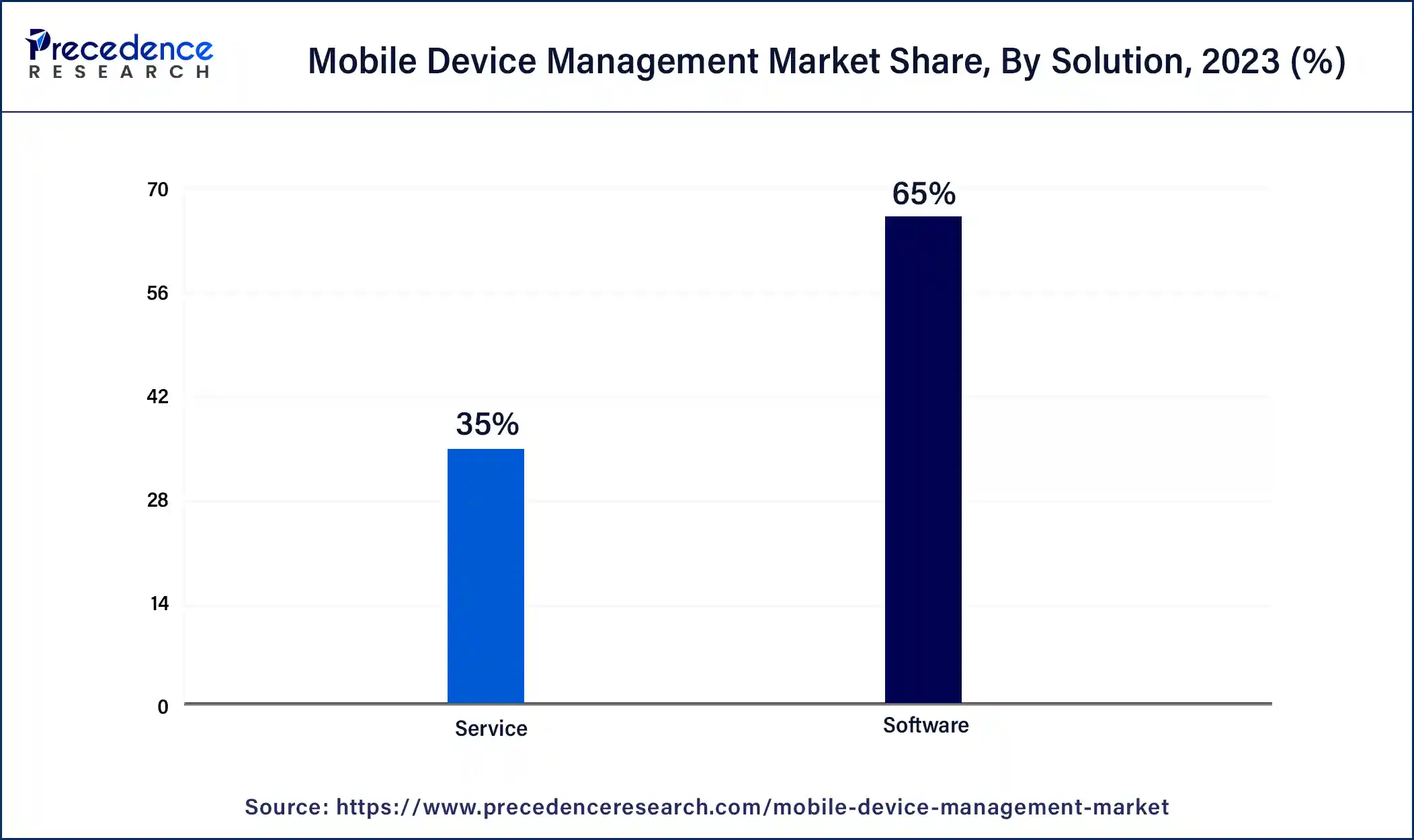
The service is expected to register steady growth in the mobile device management market during the forecast period. MDM services are gaining importance due to the increasing need for consultancy in organizations. The complexity of these solutions requires assessment in deploying services like installation and configuration of mobile device management.
The cloud-based segment held the dominant share of the mobile device management market in 2023. The growth of the cloud-based segment is attributed to the flexibility provided by the cloud-based services, as they eliminate the need for on-premise infrastructure. It is considered to be cost-effective for many small-sized organizations as it can be accessed from any remote location. These factors are helping cloud-based services to gain global popularity and also leading towards the growth of the market. For instance, Samsung is simplifying cloud-based mobile device management for small businesses with quick services and easy licensing procedures.
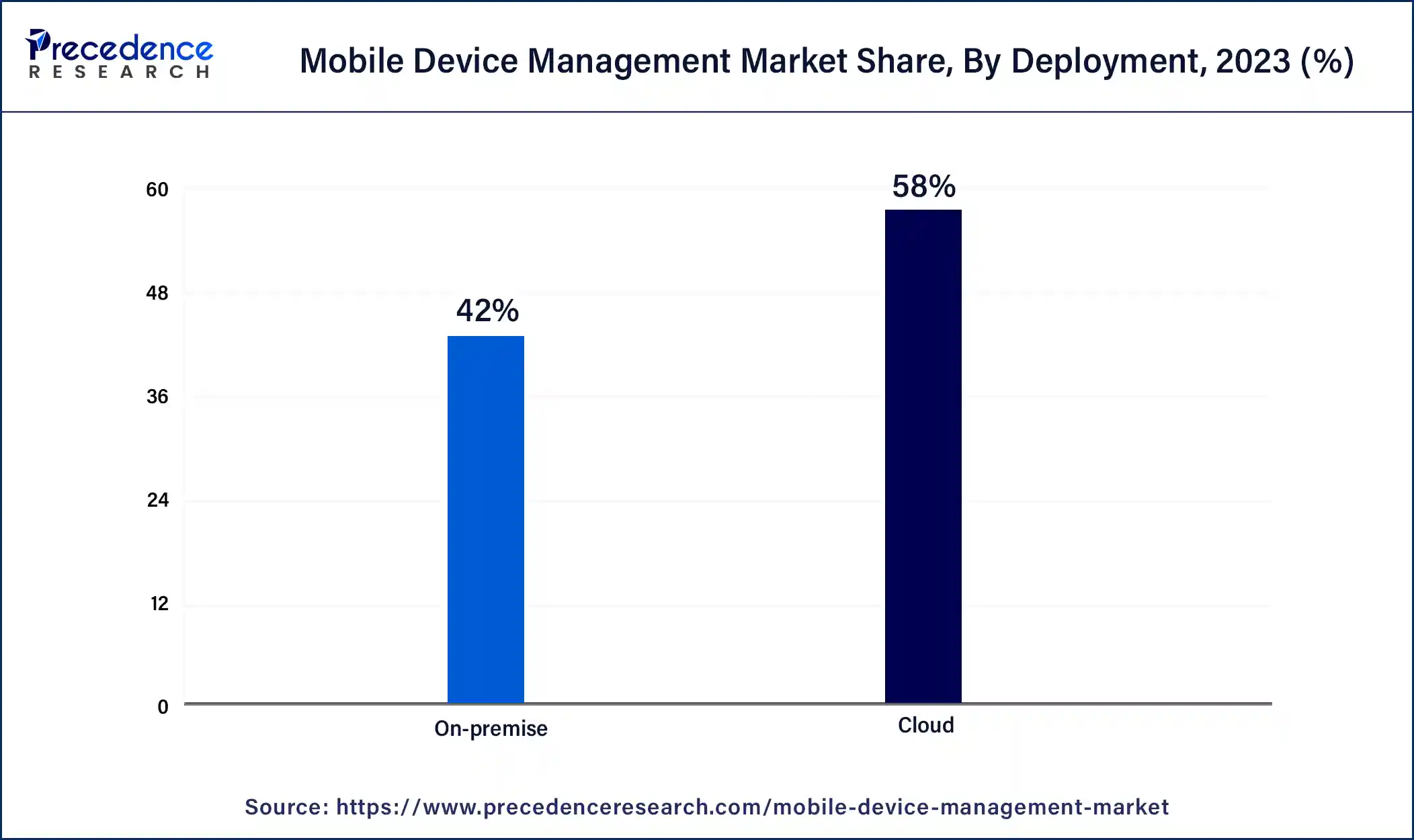
The on-premise segment is expected to register steady growth in the mobile device management market during the forecast period from 2024 to 2033. Large-sized companies use on-premise services to maintain the security of their confidential data. These deployment services are mostly preferred by government bodies and healthcare organizations that have higher security demands for their data. These companies have an established infrastructure that has access to numerous technologies.
The smartphone segment led the global mobile device management market in 2023. The growth of this segment is attributed to the affordability of global smartphones. This has increased the accessibility of smartphones, especially in developing countries, which is creating many small-sized industries. The increasing investments in Technological advancements with AI and ML are also increasing the function capability of smartphones, which provide smart assistance to users, increasing the need for mobile device management.
The laptop segment is expected to register significant growth in the mobile device management market during the forecast period. The demand for laptops has risen significantly over the past few years due to the rising shift towards remote work culture. Laptops have also gained popularity in the education sector since the Covid era, helping to maintain the workflow in the industry. The constantly evolving technologies in laptops, like core processors, battery life, and many more, are helping the growth of mobile device management.
The Android segment held the largest share of the mobile device management market in 2023. Android has been dominating due to its wider affordability. The open-source nature of Android offers MDM services and control over device settings, allowing for configuration management and other needs. These options help the user enhance security and passwords for the organizations, gaining significant importance in operating Android MDM solutions.
The iOS segment is expected to register the fastest growth in the mobile device management market from 2024 to 2033. The growth of iOS is attributed to its robust security features, which help maintain the safety of confidential data. The advanced technologies provided in iOS provide regular updates, which keep the system up to date. Many companies are shifting towards iOS to enhance their security and protect sensitive data from cyber threats. This increasing adoption is fueling the overall growth of the market.
The enterprise segment dominated the global mobile device management market in 2023. The growth of the segment is attributed to the increasing need for MDM services in the corporate environment. They help manage mobile devices to meet the needs of the organization. They also increase workflow and productivity by providing remote access to all the essential data. The rising competition in the business environment also increases the need for mobile device management services in organizations, which stands out as a potential driver for the market.
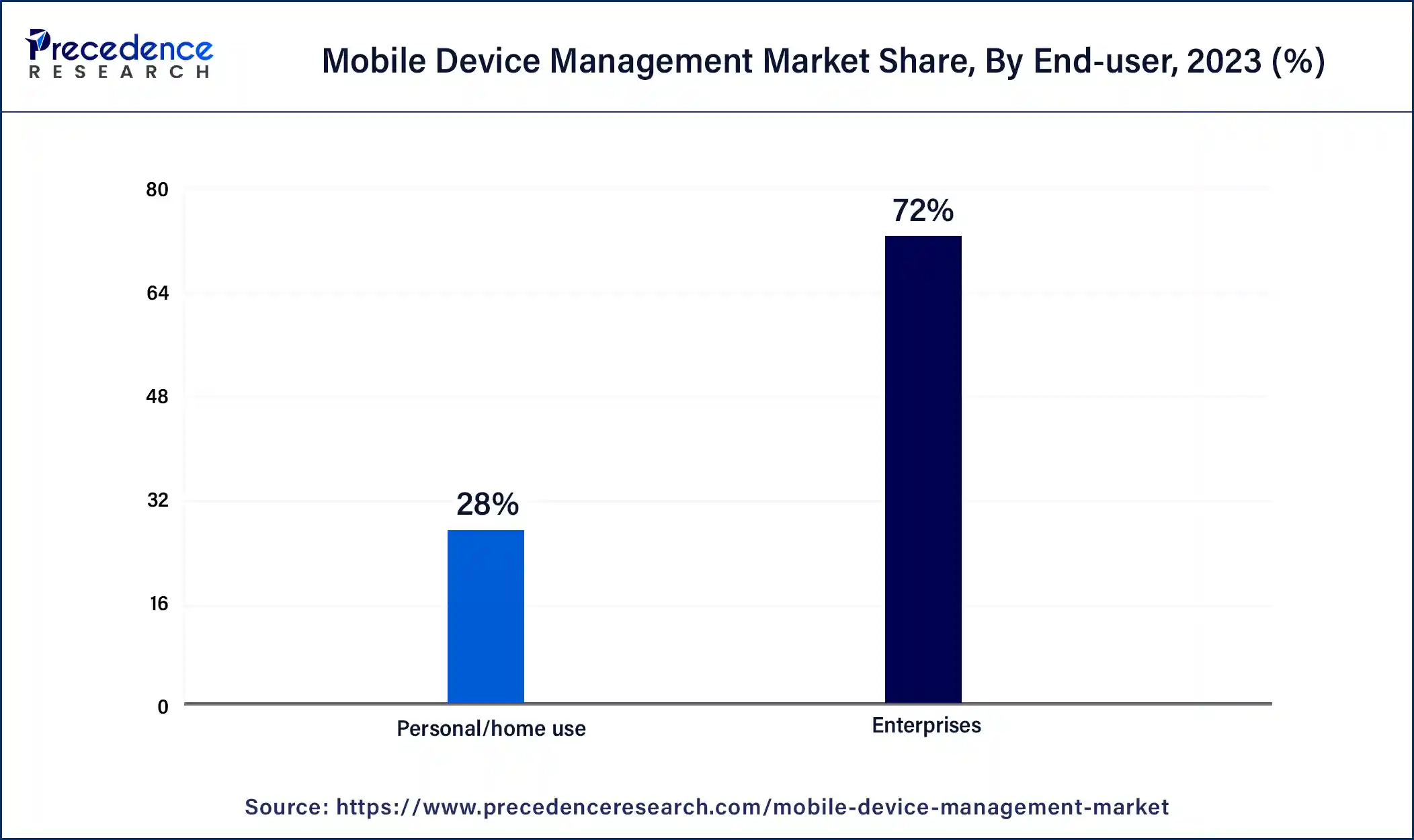
The personal/home use segment is expected to register stable growth in the mobile device management market from 2024 to 2033. The growth in the number of digital devices like tablets in homes is resulting in the need for services. This also increases the need for mobile device management because the devices may have sensitive data that needs to be protected with extra care. The rising disposable incomes are leading to an increasing number of personal devices, which is also fueling the growth of the market.
The large enterprise segment held the largest share of the mobile device management market in 2023. The growth of large enterprises is attributed to the huge employee base of their organization. Many large companies rely on MDM services, which enhance their security by implementing policies. They also have higher budget options, which enhance their overall experience and maintain the privacy of their data.
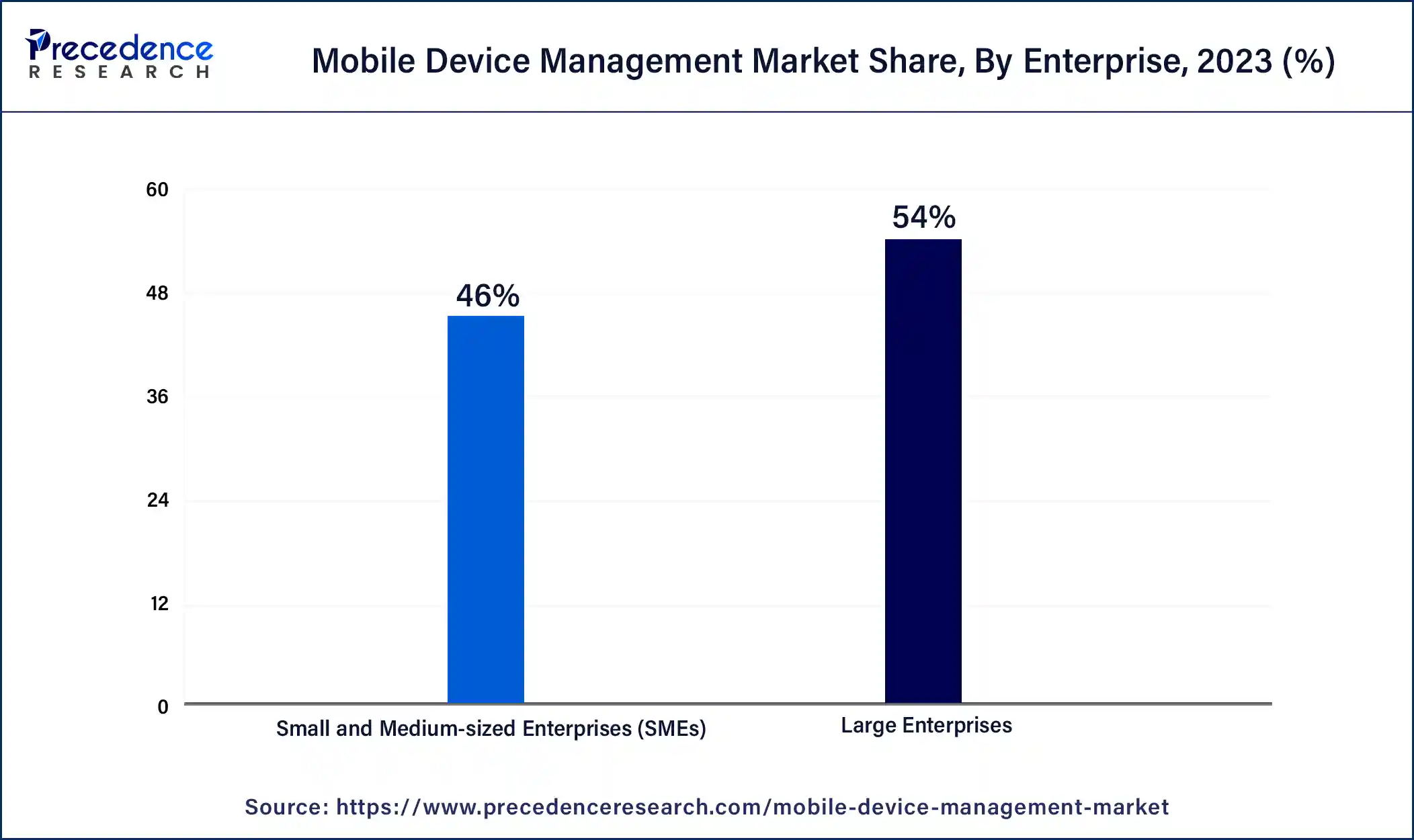
The small & medium-sized enterprise (SMEs) segment is expected to register growth with the highest CAGR in the mobile device management market during the forecast period. The increasing popularity of this segment is due to the regulatory support provided by the government for the improvement of small-sized businesses, especially in healthcare. SMEs usually have a limited work pace due to fewer employees, which usually reduces the threat but also helps manage the data by giving it significant importance. The ongoing focus on the development of SMEs is expected to increase the overall growth of the mobile management market.
The IT & telecom segment led the global mobile device management market in 2023. IT companies primarily use these devices, which is the reason for the dominance of this segment. The global expansion of IT companies is increasing the need for MDM as they can provide flexible access to data. Highly qualified professionals, especially in large organizations, are driving the growth of the market.
The retail segment is expected to register the fastest growth in the mobile device management market during the forecast period. There has been an increasing shift towards MDM solutions in retail companies to ensure the safety of their employee devices. The adoption of MDM solutions helps the company smooth its workflow and also results in significant growth.
Recent Developments
By Solution
By Deployment
By Device Type
By Operating System
By End-user
By Enterprise
By Vertical
For inquiries regarding discounts, bulk purchases, or customization requests, please contact us at sales@precedenceresearch.com
No cookie-cutter, only authentic analysis – take the 1st step to become a Precedence Research client
April 2025
December 2024
October 2024
March 2025